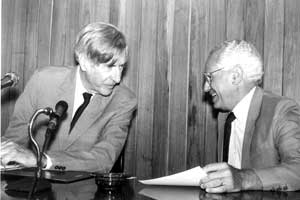IEA: A Space for Reflection and a Metalinguistic Platform
1986

John Kenneth Galbraith (left) and José Goldemberg (president of the University of São Paulo) in the conference "Arms Control and Military Power", November 27, 1986.
… In summary, with the creation of the IEA, the president’s office of the University of São Paulo seeks to fulfill a long-standing aspiration of our faculty and provide another instrument for the university to redeem its own history, stimulating an endogenous, yet internationalist process of critical reflection. It should be stressed, however, that the chosen model – which will certainly be improved with suggestions from our academic body – radically excludes the danger of transforming the IEA into a university within the university.
The goal is not to deprive our schools and departments of their substance; quite the opposite. Unlike the Colégio de México, the Collège de France or the École Pratique des Hautes Études, for instance, which exist outside the university, the model chosen by the University of São Paulo for its Institute of Advanced Studies distinguishes itself for being a space for reflection, a space to nurture advanced studies carried out within the institution by acknowledged masters of national and international repute.
2013
The Director of the University of Birmingham's Institute of Advanced Studies, Malcolm Press, presents the development of the institute in its first year of existence and plans for the future. Apr 12, 2013
Video: The Year of Development and Plans for the Future.
… 'The IEA faces a moment of generational transition. Previous administrations were committed to a more modernist model for the Institute, punctuated by great names in science and scholarship who helped to establish the main areas of knowledge in modern Brazil. Since then, however, the production of knowledge and the geopolitical contexts have undergone significant transformations. Consequently, it is necessary to strengthen the IEA’s commitment to promoting critical discussions of contemporaneity and to motivating prospective actions. To this end, an institutional critique, focused on the University’s mission and scope of actions, is required. The same critical mindset should also focus on the situation of education in Brazil, on the training of new staff in various areas of knowledge, on geopolitics and subsequent notions of modernity, and certainly on interdisciplinary actions – the driving force behind this Institution. It behooves the IEA to carry out actions that are increasingly more complex and more interdisciplinary, leading to transdisciplinarity. This is not an impossible endeavor, because the Institute, in keeping with the genealogy of this type of institution, operates as a metalinguistic platform'. Read more: Institucional project (2012-2017)
